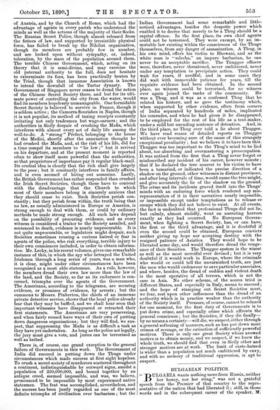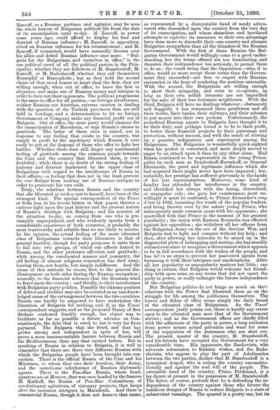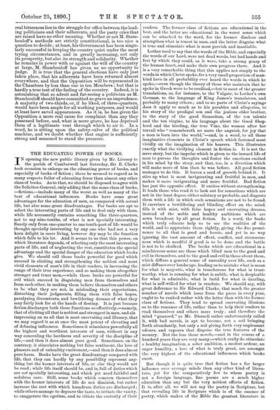BULGARIAN POLITICS.
" BULGARIA wants nothing more from Russia, neither her honey, nor her sting," was not a grateful speech from the Premier of that country to the repre- sentative of the nation that had liberated it ; still, in those words and in the subsequent career of the speaker, M. Zancoff, as a Russian partisan and agitator, may be seen the whole history of Bulgarian political life from the date of its emancipation until to-day. M. Zancoff, in power some years ago, could afford to display his fear and distrust of Russian influence ; M. Zancoff, in opposition, relied on Russian influence for his reinstatement ; and M. Zancoff, if reinstated, would have assuredly thrown over his allies and defied Russian influence once more. " Bul- garia for the Bulgarians, and ourselves in office," is the one political creed of all the political parties in the Prin- cipality, whether they are followers of M. Stambouloff, M. Zancoff, or M. Radoslavoff, whether they call themselves Russophil or Russophobe ; but as they hold the second clause of that creed nearer at heart than the first, they are willing enough, when out of office, to leave the first in abeyance, and make use of Russian money and intrigue in order to turn out their opponents. The political programme is the same in office for all parties,—no foreign interference, neither Russian nor Austrian, extreme caution in dealing with the question of the Turkish provinces that are still held in bondage, and a determination to let no foreign Government or Company make any financial profit out of Bulgaria. Out of office, the same party would clamour for the emancipation of Macedonia, or urge Russia's claims to gratitude. The latter of these cries is raised, not in response to any feeling that exists in the country, but simply to profit by the machinery which Russia is ever ready to put at the disposal of those who offer to fight her battles. Whether there does still linger any sentimental feeling of gratitude among the common people towards the Czar and the country that liberated them, is very doubtful ; while there is no doubt of the strong feeling of jealousy and distrust harboured by the upper class of Bulgarians with regard to the interference of Russia in their affairs,—a feeling that does not in the least prevent the ruse Bulgar from making use of Russian intrigue in order to prosecute his own ends.
Truly, the relations between Russia and the country that she liberated at such a cost to herself, have been of the strangest kind. The special correspondent of the Times at Sofia has, in his recent letters to that paper, thrown a curious light upon the past history and the present nature of Russia's dealings with Bulgaria ; and his account of the situation to-day, as coming from one who is pre- sumably unprejudiced, and who evidently speaks from a considerable experience of both countries, is probably the most trustworthy and reliable that we are likely to receive. In his opinion, the actual feeling of the more educated class of Bulgarians towards their liberators is that of general hostility, though for party purposes it suits them to fall into two groups, of which one affects hatred to Russia, and the other professes affection and gratitude ; while among the uneducated masses and peasantry, the old feeling of almost religious veneration has died away, leaving them, not hostile, but simply indifferent. And the cause of this attitude he traces, first, to the general dis- illusionment on both sides during the Russian occupation ; secondly, to the financial schemes that the Russians tried to force upon the country ; and thirdly, to their interference with Bulgarian party politics. Possibly the irksome position of debtor and creditor may also be counted as an unacknow- ledged cause of the estrangement between the two countries. Russia can hardly be supposed to have undertaken the liberation of Bulgaria for nothing, and if, as the Times' correspondent suggests, and as the proposed Treaty of San Stefano confessed frankly enough, her object was to facilitate as far as possible a future advance on Con- stantinople, the debt that is owed to her is very far from payment. The Bulgaria that she freed, and that has grown strong and independent in spite of her, will prove a more insurmountable barrier between Russia and the Mediterranean than any that existed before. But in speaking of Russia in relation to Bulgaria, it is well to remember that there are three very different Russias with which the Bulgarian people have been brought into con- nection. There is the official Russia of the Czar and his Ministers, to whom they owe their freedom, their Army, and the unwelcome interference of Russian diplomatic agents. There is the Pan-Slav Russia, whose head- quarters are at Moscow, that was once headed by the famous M. Xatkoff, the Russia of Pan-Slav Committees, of revolutionary agitations, of visionary projects, that keeps alive the incessant intrigues in Macedonia. And there is commercial Russia, though it does not deserve that name, as represented by a disreputable band of needy adven- turers who descended upon the country from the very day of its emancipation, and whose shameless and barefaced attempts to exploiter its resources to their own advantage have done more to discredit their own country and alienate Bulgarian sympathies than all the blunders of the Russian Government. With the first of these Russias the Bul- garian Government would willingly come to a good under- standing, but the terms offered are too humiliating, and threaten their independence too seriously, to permit them to do so ; the result being that the Opposition—who, if in office, would no more accept those terms than the Govern- ment they succeeded—are free to coquet with Russian emissaries, in the hope of rendering the position untenable. With the second, the Bulgarians are willing enough to show their sympathy, and even to co-operate, as long as their own selfish interests are not imperilled for the sake of their less fortunate neighbours. With the third, Bulgaria will have no dealings whatever ; obstinately and doggedly it has renounced these gentlemen and all their works, their banks, their railways, and their schemes to put money into their own pockets. Unfortunately, the accredited Russian agents in Bulgaria have thought it to be their duty, and perhaps found it to be to their profit, to foster these financial projects by their patronage and protection, without success, and with the result of stirring up a genuine indignation and resentment among the Bulgarians. The Bulgarian is wonderfully quick-sighted when his pocket is concerned, and more deeply moved to anger by an attack upon it than by any other cause. Had Russia continued to be represented in the young Princi- pality by such men as Dondoukoff-Korsakoff, or General Ehrenroth, the great and legitimate influence which she had acquired there might never have been impaired ; but, unluckily, her prestige has suffered grievously in the hands of her late representatives. Moreover, some kind of fatality has attended her interference in the country, and identified her always with the losing, discredited, or unpopular side ; she gave her countenance, most un- willingly it must be confessed, to Prince Alexander's coup d'etat in 1882, incurring the wrath of the popular leaders, and being thrown over by the astute young Prince, who subsequently made common cause with his opponents ; she quarrelled with that Prince at the moment of his greatest popularity ; the union with Eastern Roumelia was effected against her opposition ; she withdrew all her officers from the Bulgarian Army on the eve of the Servian War, and Bulgaria had to fight and conquer without her help ; and then, after allowing her interests to be mixed up in the disgraceful plots of kidnapping and mutiny, she has steadily refused ever since to recognise a Government which appears to be in full accordance with the wishes of the people, and has taken no steps to prevent her unavowed agents from harassing it with their intrigues and machinations. After all, her popularity or unpopularity matters but little ; one thing is certain, that Bulgaria would welcome her friend- ship with open arms on any terms that did not upset the party in power, or really endanger the future independence of the country.
But Bulgarian politics do not hinge so much on their relations with the Power that liberated them as on the struggle for life among the politicians themselves. The loaves and fishes of office mean simply the daily bread of the educated class of Bulgarians. As the Times' correspondent justly points out, there is hardly any career open to the educated man save that of the Government service ; and as the Government offices are chiefly filled with the adherents of the party in power, a long exclusion from power means actual privation and want for some of the supporters of the statesmen who are shut out. The present master of the country, M. Stambouloff, and his friends have occupied the Government for a very considerable time. His opponents, the Zankovists, who advocate submission to Russian wishes, and the Rado- slavists, who appear to play the part of Adullamites between the two parties, declare that M. Stambouloff is a tyrannical despot, who is ruling the country unconstitu- tionally and against the real will of the people. The ostensible head of the country, Prince Ferdinand, is a lay-figure at present in the possession of M. Stambouloff. The latter, of course, protests that he is defending the in- dependence of the country against those who favour the insidious designs of Russia to reduce Bulgaria to a state of subservient vassalage. The quarrel is a pretty one, but its real bitterness lies in the struggle for office between the lead- ing politicians and their adherents, and the party cries that are raised have no other meaning. Whether or not M. Stam- bouloff's methods are strictly constitutional, is too nice a question to decide; at least, his Government has been singu- larly successful in keeping the country quiet under the most trying circumstances, and in greatly increasing, not only its prosperity, but also its strength and solidarity. Whether he remains in power with or against the will of the country at large, M. Stambouloff has given us no opportunity to judge. It is true that the general elections have only just taken place, that his adherents have been returned almost everywhere, and that the Opposition will be represented in the Chambers by less than one in ten Members ; but that is hardly a true test of the feeling of the country. Indeed, it is astonishing that so adroit and far-seeing a politician as M. Stambouloff should have committed so grave an imprudence. A majority of two-thirds, or, if he liked, of three-quarters, would have been ample for all working purposes, and would at least have saved appearances. As it is, he has given the Opposition a more real cause for complaint than any they possessed before, and, what is more grave, he has deprived them of a legitimate vent through which to air it. In a word, he is sitting upon the safety-valve of the political machine, and we doubt whether that engine is sufficiently strong and seasoned to stand the pressure.








































 Previous page
Previous page